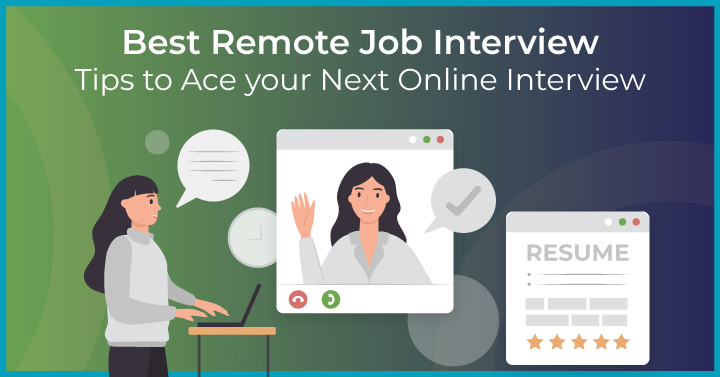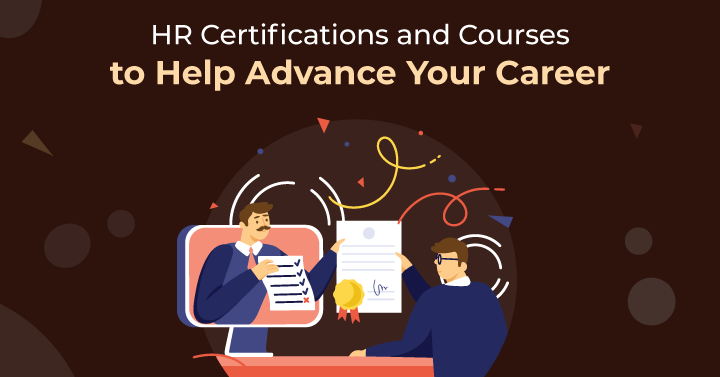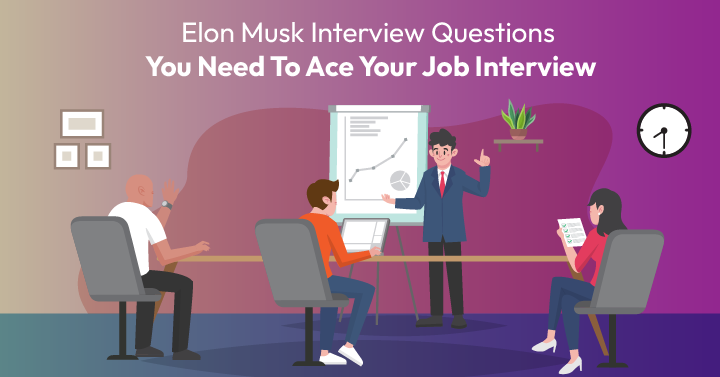The remote job interview scenario has undergone a radical makeover with the increasing use of latest technology for communication and collaboration tools. This makes it even more important when you think of how to nail a remote job interview.
So if you feel like you’re wading through uncharted waters, set aside your niggling worries and let us help you navigate through a remote job interview like a pro using our handy remote job interview tips and best practices.
1 How Do I Prepare for a Remote Interview?
Some of the remote job interview tips here will help you prepare more confidently for a remote interview. Ensure that you choose a professional-looking space that’s well-lit and free from clutter. Test your video conferencing platform to avoid last-minute hassles. Research the company you are applying to and prepare a well-rehearsed summary on your profile You can also add a few questions of your own with regard to the job and save them for the end of the meeting to show proactive engagement.
2 How Are Remote Job Interviews Done?
Remote job interviews are conducted on popular video conferencing platforms such as Skype, Meet, and Zoom. The invites are usually sent via email with relevant details. When it comes to conducting remote job interviews via conferencing tools such as these platforms, some handy remote job interview tips are to check for device compatibility and network speed.
3 How Can I Impress in an Online Remote Job Interview?
In order to make a great first impression in an online remote job interview, you can consider a few of these remote job interview tips. Ensure that you are present for the interview at least 5 mins in advance. Ensure that you research the company well and introduce yourself in the best possible way.
4 What Are the Challenges of Remote Interviews?
While flexibility is a pro when it comes to remote interviews, the flip side has its share of cons too. As a remote job interview is entirely conducted using audio or video conferencing tools, technological glitches can be an issue due to unforeseen circumstances creating disturbances in audio or visuals. The very nature of remote interviews can also make it difficult to create a more personal connection with the interviewer as compared to an in-person interview.
5 Overview of Remote Job Interview Tips

5.1 How to Write Your Remote Job Resume With Templates
A well-crafted resume is the first step to making a great impression on the interviewer when applying for remote working opportunities. A good resume covers all salient points that give relevant information based on your skills and experience to the interviewer.
5.2 Zoom Interview Tips for Job Seekers
With Zoom being the most popular video conferencing platform nowadays, it helps to have some handy tips to ensure you ace your Zoom remote job interview to make a great impression. We cover important elements such as device compatibility, the importance of lighting, how a professional background can make a world of difference, and much more.
5.3 Remote Job Interview Questions + Sample Answers When Hiring
While there is a slew of remote job interview questions that you can explore when preparing for an interview with a potential candidate, it’s important to narrow these down to the most relevant when it comes to a remote hire. Scroll through some of the most pertinent remote job interview questions and answers that you can use as guiding factors when taking that important call to finalize or not in the context of remote working.
5.4 Ways to Answer "What Can You Contribute to This Company?”
We give you different variations on how to answer this classic interview question with relevance to a remote work setup. These answers can serve as helpful remote job interview tips when it comes to proving why and how you can be a valuable asset to the company with practical examples.
5.5 Ways to Answer “Tell Me About Yourself” in Your Interview
Despite being a traditional question in any interview, “Tell me about yourself” is a deceptively simple way of getting to know you and whether you would be a good fit for the company through your own background story. We share ways on how you can showcase yourself in the best possible way to make a great impression in your next remote job interview
5.6 Ways to Answer “Why Are You the Best Person for This Job”
As another commonly asked question, the interviewer is looking for insights on what you can bring to the table with relevance to your skills and experience when it comes to the job you are applying for. Look at some of the professional sample answers shared here to help you create a well-articulated response/ that brings your strengths to the forefront and leave the interviewer with a favorable impression at your next remote job interview.
5.7 How to Answer “Why Do You Want to Work Remotely”

If you are someone looking for a remote work opportunity, then this is a question that needs to be answered accurately and convincingly. While there could be plenty of reasons to choose a remote job, an interviewer is specifically looking to see if your goals or objectives match or align with company requirements too. Explore different ways to answer this remote job interview question confidently for
5.8 Effective Ways on How to Discuss Salary in a Job Interview

One of the most pivotal deal breakers in an interview is the discussion on salary. This needs to be a mutually agreed parameter for both the interviewer and candidate and needs to be discussed with diplomacy. We share easy and effective ways for you to prepare yourself to negotiate salary expectations during an interview.
5.9 Template Answers for Where Do You See Yourself in 5 Years
Instead of giving a cliched response to this interview question, you can use it as an opportunity to convey your work preferences and future goals more specifically. This will provide valuable insights for the interviewer to gauge your career aspirations and also help in charting out a progression path for you in case you are finalized for the role. We share some tailored template answers to help you formulate your response.
6 Remote Job Interview Tips and Remote Job Interview Sample Questions and Answers

6.1 How to Write Your Remote Job Resume
- Do Your Research
Before you even begin to create a resume, do some research on the company to get some more background on how to align your skills and experience in line with the company’s work practices and business goals. You can read about their history, what they do and the latest updates on the Home page, news updates, and press releases on the company website or affiliated social media pages to get a fair idea.
- List Down Past Remote Work Skills and Experience
Ensure you list down all your past work experience and job skills that could put your resume in the front-runner position. Use the summary to highlight your experience in total and then list down the experience and skills for each job in chronological order.
- Showcase Your Skills Using Remote Collaboration Tools
The main crux of communication and collaboration revolves around communication software for any remote job. It would be in the best interest of you to show how familiar you are with remote communication or collaboration tools such as Zoom, Teams, Slack, Trello, and other popular platforms. Read the job description to understand the company tools used to get a more clear understanding of their remote work practices to ensure you are aware and prepare pre-hand
To learn more remote job interview tips and access free sample question answers, read our full article here.
6.2 Effective Zoom Interview Tips for Job Seekers
- Get Familiar with Zoom Features
Spend time familiarizing yourself with the most commonly used or primary features on Zoom before the main day. This will help you gain more confidence in navigating the interview smoothly. It’s a good idea to conduct a mock interview as well so you can get a little hands-on experience with options such as screen view, raise a hand, annotation feature, or Zoom chat.
- Use the Professional Mode
Any interview typically calls for a professional mode even if it’s a remote option. Choose a solid or neutral background in a well-lit and professional-looking space to make a good first impression. If you’re having problems with space, the safest bet is to choose the Blur option to hide your background.
- Consider Effective Lighting
Put yourself in the best light literally when it comes to the interview. This means you need to choose a well-lit space where the lighting helps the interviewer to get a clear picture of you minus the halo effect or shadows. Avoid light sources that are behind you and ensure that the angle is slightly above you instead to create ambient lighting that’s appropriate for a professional interview.
To read more Zoom interview tips for job seekers, read our full article here
6.3 How to Answer Why Do You Want to Work Remotely
- Focus on the Benefits
Your response to this needs to be more than just a casual need to explore a remote setup. Convey what kind of benefits have influenced your decisions along with your personal reasons for choosing a remote option. These could be due to a need for more flexibility in terms of hours or location. This will give the hiring manager more clarity on what your expectations are and whether they can be aligned in the future role.
- Sync Your Expectations With the Employer’s Benefits
Present a convincing case of how your remote work parameters and the company benefits match for success. If you are looking for a more flexible work routine, you can explain how much easier it will be for you to match work schedules in a remote setup leading to increased productivity.
- Focus on Value-Addition
While your response can revolve on the benefits you get by working remotely, you will also need to showcase how those benefits can add more value to work processes or goals in the new organization. This will make a considerable impact on gauging how much of a team player you are and how your skills or experience will align with the company’s long-term vision or goals.
6.4 Ways to Answer "What Can You Contribute to This Company?” [Sample Answers Included]
- Emulate the STAR Interview Method
The STAR method was actually developed to guide interviewees in responding to hypothetical questions that give behavioral insights. Based on four parameters, Situation, Task, Action, and Results, you can create a response that describes a specific situation where you formulated a solution that was based on the responsibilities or tasks given and actionable measures that were taken to deliver positive results. This gives plenty of information to the interviewer on your work personality.
- Exemplify Your Skills
While your answers may pass the mettle, it’s always wise to back them with real-time examples or use cases. You can describe situations or conflicts that you faced at the workplace and how you arrived at favorable outcomes. These could be related to planning, rescheduling, communicating, or upskilling.
- Align Your Skills With Company Expectations
It’s important to ensure that the interviewer is able to see how closely aligned your skills or experience is with company expectations. While your resume speaks for itself, you need to validate that with practical examples of how your skills can be used in the best possible way for more value-addition in your future role.
6.5 Ways to Answer Tell Me About Yourself in Your Interview
- Void a Verbatim Resume Recital
Since your resume has already been viewed, it’s a moot case to recite the resume word-for-word all over again. You can share bits and pieces of information that need to be reiterated, however, you also need to make sure that the rest of your response should give new insights or more character to your work profile outside the realm of the resume. This will make the interview more engaging and relevant to the job you are applying for.
- Showcase Your Skills
You may have added a clicked or laundry list of skills on your resume that may seem relevant, but it’s wiser to highlight those that are specifically relevant to the job description. For instance, if you are applying for a role in sales or marketing, excellent communication as a skill won’t give you a lot of mileage. Instead, list down some specific technical software or tools such as Google Analytics that you use that can boost sales volume, web traffic, and more. This will give the interviewer something more solid to substantiate or evaluate.
- Align Your Career Goals With the Role
Give the interviewer a valid explanation of why you think they should consider you as a long-term asset to the company. You can share your long-term goals and explain how they fit with the profile you are applying for so it would be a benefit for the company too.
6.6 Ways to Answer Why Are You the Best Person for This Job
- Specific Measurable Examples
Another one of our remote job interview tips is to share examples. The response you share needs to have quantifiable examples to back it up. These examples should be able to prove how you utilized your strengths or skills to bring out positive outcomes such as completed targets, increased sales or revenue, a boost in conversions, and more.
- Tailor Your Strengths and Skills
Your resume is the springboard that you can use to project your aspirations, strengths and skills. However it would be in your interest to tailor these to suit the job profile that you are applying for. The idea is to ensure you can use these strengths to present a convincing case of why you will make the best possible candidate for this role.
- Go in for the Long-Haul
Align your career goals and the company goals to showcase your long-term compatibility based on the role you are applying for. This would be a win-win for you and the company as they can consider you as a long-term asset as well.
6.7 Effective Ways How to Discuss Salary in a Job Interview
- Choose the Right Timing
Salary negotiations require tact and effective communication. It’s best to reserve any discussion on salary until after you have completed your second round of interviews unless the hiring manager raises the topic before that. Once you have been notified of being a finalist, you can politely discuss your expectations based on your merits.
- Ask for In-Depth Questions
Instead of trying to second-guess what associated perks and benefits will form a part of your compensation package, it’s best to ask for more details in the same context. Check for variable pay factors, tax components, health benefits, paid holidays and more to get a clear picture of what is being offered before you sign on the dotted line. Consider what desirable employee benefits you have in mind before arriving at a decision.
- Give a Salary Range
If you find yourself in a position of being the first to discuss a salary figure, the safest way to navigate around this is to offer a range. This salary bracket should make room for both you and the interviewer to have a mutually agreeable discussion on. Ensure that the minimum figure is something that you are absolutely sure in case the maximum figure is not being met.
To explore effective ways on how to discuss salary in a job interview, read our full article here
6.8 Best Template Answers for Where Do You See Yourself in 5 Years
- Sample Answer : Recent Graduate
“In the next five years, I’m principally looking to get some solid real-world experience. I’ve spent the past 3 years at university studying the latest marketing and communications strategies, including those based around new digital media, and I believe I could use that knowledge to benefit ABC Communications, while at the same time taking advantage of the great training opportunities on offer at the company to develop as an executive.”
- Sample Answer : Project Manager
“Over the next 5 years, I see myself putting my 10 years of leadership experience towards running a larger team. My past track record is evidence that I’m able to create strong growth with teams of just a handful of people. I’m excited to be able to show that I have the organizational and interpersonal skills to take on bigger projects with bigger teams and still produce the kind of return on investment I’m used to creating.”
- Sample Answer : Software Development Engineer
“I’ve spent the last 5 years honing my programming skills in a well-known company, editing and amending code. In the next five years, I’d like to take those software development skills into a more prototype-driven environment. I believe the opportunity with your business will provide me with the chance to demonstrate my ability to deliver time-sensitive projects and, given the growth of the organization, I hope to eventually move into a project management role, overseeing a team of software engineers.”
7 FAQ’s
- How to answer interview questions?
A remote job interview needs to be responded to in context to remote working and its associated considerations. Some of our helpful remote job interview tips are to ensure that you practice mindful pauses and answer in relevance to the questions being asked. Make sure to support your responses with verifiable examples to make a more positive impression.
- How do you introduce yourself in a remote interview?
To introduce yourself in a remote interview, take a few remote job interview tips into consideration such as to greet your interviewer and then share a short and crisp summary of your candidature. Your response should talks about your current profile and past experiences without going too much into detail or reciting your resume.
- Is it okay to wear headphones during a virtual interview?
Yes, wearing a pair of headphones for an interview is one of the best remote job interview tips to follow. Invest in a good pair with noise-canceling functionality to ensure you have minimal distractions and can conduct yourself smoothly through the interview process.
 Interested in Virtual Team Building Events?
Interested in Virtual Team Building Events?





















